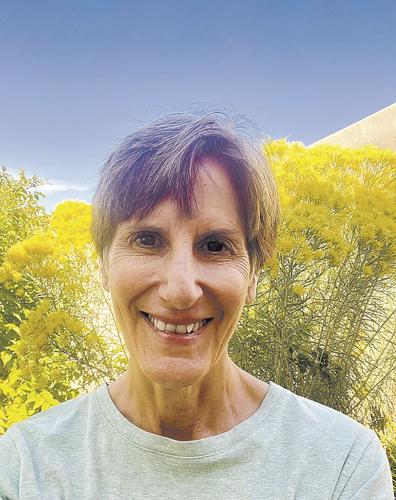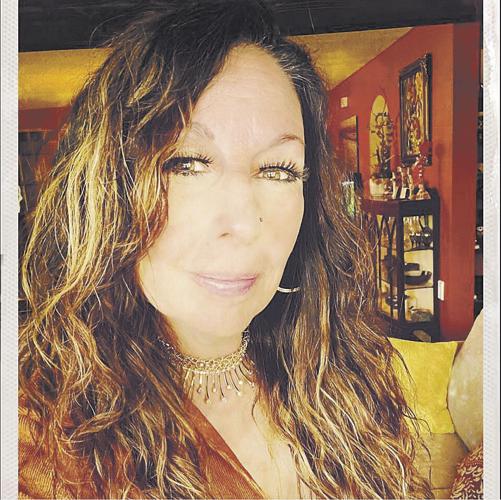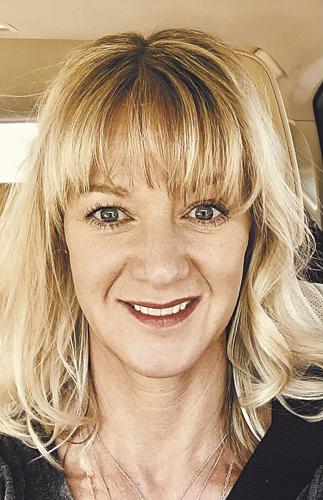FIRST PLACE
Rain God
Daisy Gorman-Nichols, White Rock
I met a rain god today. Slight, shifty, changing movements and space moment by moment. One eye was blue, the other dark gray.
I ask him why he is so tight with the rain these days. He laughs, “I’m just here to clean the windows, lady. Nothing more.” His grin drips sarcasm and wit. He gets to work and slowly washes away the grime, the dust; the water stains that I have only been able to smear around. Some old commercial comes to me — bright music plays in the background and “Sparkling clean” is displayed across the screen. A man dressed in white from top to toe, tipping his hat to the perfectly perfect done-up housewife.
The job is done. The light in the house is different now, bright, streaming through the clean glass. I walk him out to his truck, hand him money.
“Oh wait, I forgot, I wanted to give you something!” I start running back to the house. I glance back to see if he will wait. He leans lightly against his truck, his body flowing against the bumper.
His eyes are turquoise and 55 Chevy blue as I return. “These are cherries from my mom’s place. They are for you and your family.” He looks at the old cloth bag that I am holding out.
“You can keep the bag,” I say when he doesn’t immediately reach for it.
His hands are large and damp. He takes the bag and brings it to his face. His deep, deep inhale is like the wind right before the rain. “From Rinconada?’
“Yeah.”
“You just picked them yesterday. Why don’t you eat them?” My mind should question how he knows this but I kinda remember him being there, a soft cloud blocking the brutal sun.
“We have had our fill. Take them.”
He smiles. His eyes are soft gray, mist on a winter day.
“Thanks. We love cherries from the valley.” He hops into his truck, old and rusty, condensation on the inside of the windows. I watch him drive away. I turn and walk back across the driveway, through the gate.
The first drop surprises me as it hits my cheek. The second, third, fourth are bigger and splash on the flagstones. The rain is incredible — it has been months since we have had any. It comes down at first strong and then soft and then it is gone. I get a text message an hour later,
“Reminder: Rainman Window Cleaning LLC, does not rewash windows if there happens to be a storm.” I smile, enjoying the wit of a rain god. Then one more text: “Thanks for the cherries. Offerings are always accepted.”
Daisy Gorman-Nichols was born in Chimayó and has spent most of her life living in the Rio Grande Valley. She is a teacher, farmer, and writer.
SECOND PLACE
Compassionate Release
Shannon Kilgore, Santa Fe
Hours before the hearing’s scheduled start, the courtroom filled with the curious, impatient for a glimpse of evil. Would the Banker enter a defeated man, or would he deliver a spectacle of wickedness unbowed? Stride in smoothly or slouch in a wheelchair? And what of his lean handsomeness, so eagerly recorded by news photographers back in the day? Everyone longed to see how the town’s most hated citizen had weathered 41 years behind impenetrable walls.
In her chamber, the Judge dabbed moisture from her neck and zipped her robe. Today’s docket — not the usual DWIs and misdemeanor thefts — would bring her face-to-face with the man sentenced by her grandfather, the county’s storied jurist, in the case of his career. Before he died he told her, “For most people, lying is an anxious enterprise. Not for the Banker. Falsehood flowed from him like music from Mozart. But, in the end, his own records sealed his downfall.” He added, “Completely.”
The hearing was brief. The ancient petitioner took quaking steps down the aisle, supported more than guarded by four sheriff’s deputies. The Banker’s head wobbled but maintained a dignified uprightness. His famous face had collapsed, the mouth practically invisible inside a deep horizontal crease that traveled across both cheeks. Each iris, still startlingly aquamarine, peered inquisitively from a yellow sclera.
The Banker’s lawyer invoked old age’s toll and his client’s recent lung cancer diagnosis. Denied parole, the man had served all but four years of his unheard-of sentence — for purely financial crimes! No one could seriously argue he should be denied compassionate release!
The State argued exactly that, vigorously. “This man’s vast fraudulent scheme,” cried the State’s attorney, “shattered lives and still affects families today. His crimes were deliberate and numerous. He receives medical care in prison. Where. He. Belongs.”
The emphasis on “numerous” criminal acts was pointed. True, the Banker had been convicted of multiple counts of fraud. But everyone grasped the subtext.
For years, billboards with images of two murder victims loomed over the town’s roadways. Women, both 19 years old. The pair of slightly dated high school yearbook photos showed faces as yet unmarred by life. “CALL WITH INFORMATION,” the signs implored. The two had worked at a semi-rural bar that (prior to its reincarnation as an upscale pub) was a destination for paid sex. The Banker never bothered to hide his elegant car, regularly parked under the blinking “BEER” sign. It was no secret he fancied waist-length hair. After being questioned three times about the killings, he publicly taunted the prosecutor, daring him to pursue homicide charges. Instead came only the fraud case. The prosecutor was overheard to insist, “Fraud leaves a paper trail. Strangulation doesn’t.” No one was ever charged with the murders. The women’s loved ones wandered helplessly through time, both sets of parents and a sister eaten alive by a slurry of alcohol and poisonous rage.
That night after the hearing, a bartender took the Judge’s order for sparkling water. Her face had the roundness of girlhood. She smiled in a sweet, elusively familiar way.
The Judge asked, “Have you worked here long?”
The bartender barked a laugh, unexpectedly harsh. At that moment, the Judge’s friend arrived, walking up and pointing at the Judge’s glass. “Is that fizzy water? Don’t you want something with a little more kick?”
“You know I never drink if I’m going to drive. If I get even stopped for suspicion of DWI, my career is finished on the spot.”
“Well, I’ll have an old fashioned.” The friend eased onto a barstool.
The Judge shifted to face her oldest companion. A pause. “Listen. I’m leaning toward granting the Banker’s petition.”
“No! I was afraid of this! How could you possibly live with yourself?”
“Where is my choice? Terrible prognosis, advanced age, and weakness he has in spades. He’s served nearly all his sentence — for nonviolent acts. I can’t keep him locked up because of crimes he wasn’t even convicted of!”
“We have compassion for the murderer. Forget about justice for the women.”
The bartender slid the old fashioned and a second sparkling water across the bar. The Judge said, “Thank you, but I didn’t order another one.”
The girl made a wincing expression. “I think maybe you had a rough day? This water has lemon. No charge!” That smile.
The Judge, warming at this small kindness, nodded her thanks and took a sip. She inclined toward her friend. “I know you wanted to come here tonight because of the connection to all this.”
“Yes. Think about it. They were taken from upstairs and killed out in these woods. Things happened right over our heads.”
In a brief trick of her eyes, the ceiling pushed down toward the Judge. The billboards had been a fixture of her childhood, ever-present reminders that monsters exist. She reached across and helped herself to a swallow of her friend’s cocktail. She would have loved to tilt it back. But she returned to her water.
Her friend probed, “Would your grandfather free the Banker?”
“My grandfather would follow his obligation under the law.”
This declaration was met with a gently dubious eyebrow raise.
They drank in silence. Standing to leave, the friend squeezed the Judge’s shoulder and whispered in her ear, “Don’t forget the women.” The Judge lingered. She nibbled her lemon twist and tried not to imagine the rooms above.
Finally, she slid down from the barstool. The floor heaved and pitched like a ship’s deck. As she placed a hand on the polished wood bar to steady her balance, she noticed the bartender’s face watching through a small square window in the door to the kitchen. The Judge stumbled outside beneath the neon sign and into her car. Pulled out, began to accelerate.
Dear God … there was a figure — the bartender running — no, gliding — in front of the car. Illuminated by the headlights and — could it be? — a glow within her, she hurtled straight-on with long hair streaming, mouth agape in a noiseless scream. The Judge yanked the wheel to the left and braked hard, skidding sideways into a thunderous smash with a tree on the passenger side.
The airbag’s vapor was acrid. There was no blood or pain, just a stupor she recognized as inebriation. She foggily recalled the lemon water. Then came the shock of comprehension. The scene had been masterfully crafted: one smoldering car, the driver staggering, pupils undoubtedly huge, odor of whiskey. Well, that last part — superfluous, but further damning — was her own fault. Sirens and flashing lights would soon sweep around her. She would not have the chance to grant the Banker’s petition. Or rule on anything, ever again. The young woman to the left on the billboards, who had smiled down from death on the Judge’s daily trips to school, had seen to that.
The car made soft hissing and popping sounds. In this shadowy forest, long ago garlanded with police tape, leaves rustled. The spot was slightly elevated and, through the trees, the lights of downtown were discernible like remote glimmering stars. A lonely place for a final, ragged breath. The Judge felt a chill. She exhaled. And whispered a message into the darkness: “I understand.”
Shannon Kilgore: I live with my husband in Eldorado, where I read and write fiction.
THIRD PLACE
Elaine’s Last Garden
Janna Lopez, Santa Fe
Elaine’s garden was as colorful as it was precocious. In a wild sensibility, orange and blue and yellow flowers burst through the earth during seasons they should have slept beneath soil. But how else would a garden belonging to Elaine behave?
The morning of Elaine’s passing was sun-kissed and frosty. A river of neighbors ebbed and flowed to stoke a steady fire simmering in the cast iron pit. Through the half-opened slider I saw swirls of lavender smoke rise above heaps of glowing wood. An occasional crow landed on the willow’s bare limbs.
Elaine was fixed in the portable bed stationed in her cozy living room. Traces of piñon incense mingled with gently dancing dust sparkles that passed through light beams seeping in the window. The flimsy hand I cradled felt pulpy. When Elaine’s eyes were closed (which they’d been for many hours) I attempted longer glimpses. To search for recognition of an Elaine I’d known — the shiny cheeks of my neighbor, my friend, a soul sister — through the collapsed gray her face had withered to.
In a town like Taos, news spreads faster than mayonnaise on a warm toasted bun. While in the yarn store a few weeks ago, Elaine shared with Chandra she was leaving treatment behind. She was through with everything tasting metal, and the agitated sensation of poisoned veins.
When I heard the news, I laughed. Such news required us to be more civilized than human shock enabled.
Elaine had ordered a white wicker casket, which arrived ahead of schedule. That day a few of us were helping her sort through some boxes and papers. We were having a good time, sipping wine in the middle of the day, as if she was merely moving.
“No poor bastard has to care if I saved $6 dollars on toilet paper,” she mused as she tossed the receipt into a brown paper bag. Then we heard the knock. We stopped mid-sifting and looked at each other. I got up to open the door and there stood a UPS delivery man with a clipboard. Behind him was a long narrow box that resembled a canoe. “Elaine Fields?”
“Uh, yeah.” Bewildered, I glanced to Elaine. She offered a resigned half-smile then nodded.
“Sign here,” he said.
I scribbled onto the slip held by the clipboard as he ripped the yellow copy free, handed it over, and departed with, “Have a good day!”
“Well, lucky me.” Elaine sipped her chardonnay and sighed. “That’s my casket. It was supposed to arrive later. I wanted an advantage of seeing what eternity looked like.”
The facade of her cross-town move evaporated.
I called Roberto, Serge, and Ed to help us relocate then dismantle the long box. After it was unpacked, we stood around staring at the white wicker casket. It was pretty? Imagination couldn’t bend to pictures of such a before and after.
Elaine lifted the loosely hinged cover, and as if a cat seduced by a box’s mystery, she crawled in. Roberto, Serge, Ed, Lillyanna, Chandra, and myself awkwardly hovered over Elaine playing dead.
“Wow,” she said with arms tucked tightly. “Not a lot of room.”
Snapping gravity, I asked, “Were you hoping to get a roommate?”
“Yeah, that’s all I’d need — to be trapped with infinite bullshit.”
Serge stuffed his hands deeper into his pockets.
Roberto scanned the ceiling.
Ed stepped back from the coffin basket.
I reached for Lillyanna’s hand while Chandra slipped to the kitchen to boil water for tea.
“Do me a favor,” Elaine said. “Close the lid and carry me around. I wanna know how heavy I’ll be.” We stiffly glanced to one another. Knowing Elaine’s bold beauty as intimately as my own heartbeat, knowing this moment would sear into memory of her aliveness, knowing life dispensed unrelenting glimpses of her death, I reached to lower the top. It crunched and creaked the way fresh woven wood does when shifted.
“Ok, my dear, here we go … ”
With my eyes I cued the group to pick up a protruding handle. “One, two, three, and LIFT!”
We raised Elaine waist high. Indeed, beyond weightless skin and bones, was overwhelming density from a past and present and future and regret and confusion and imminence and memories and love and fear and anger that swarmed the box.
“How ya doin’?” I asked.
“Oh, there’s a little light,” she said, then with an exaggerated British accent cackled, “God save the Queen!”
Maybe it was Elaine’s unexpected outburst, or the absurdity of a faceless box talking, I began to chuckle. The weight of it all became unbearable.
“We better drop it,” I said through what was devolving into uncontrollable giggles. We rested the coffin on the ground, and my insides, shredded by grief, bellowed out unrelenting snorts. Wave after emotional wave besieged. Everyone stared, including Elaine who sat up in the box, as my laughter seamlessly tumbled into a tsunami of a lost child’s tears …
Now Elaine’s breathing was sparse. Seconds expanded between her chest lifting and lowering.
Anticipation kept me both transfixed and wholly afraid. And like the enduring mysterious gift of flowers that shined in winter, Elaine feebly woke up. She recognized I was there and managed a frail smile. We locked eyes. Hers were green and radiant and familiar. She softly spoke and asked if she could have more coffee, as if she wanted to stay awake just a little longer …
Elaine delicately lowered her lids, never breaking her gaze with my eyes, until they shut.
No chest lift followed.
Moments later I unceremoniously released Elaine’s cold hand from mine to step outside.
Her garden was cheerful. I wondered if her beloved spring flowers could somehow make it, remarkably bloom in winter, for the next person who called this home?
Facing the back was Taos Mountain. Elaine once said that watching the moon shyly rise above the massive ridge — the reason she bought her house 18 years ago — was better than sex.
With several neighbors and friends milling around the fire who would learn the news, I remained silent. I trudged to the garden’s edge. With a lost child’s might, I transmitted the message across the chilly turquoise sky, all the way up to the majestic mountain top: Hey! Moon to rise! Soon you’ll have a beautiful new friend to greet you …




